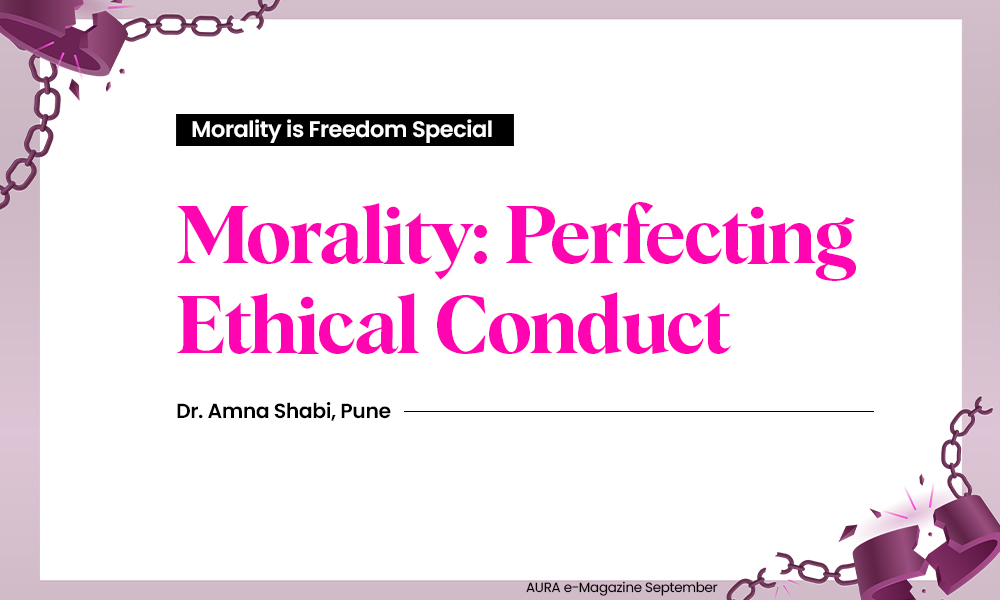‘I was sent to perfect the ethical conduct’.
– Quote by Prophet Muhammad as reported in Muwatta Malik.
In Islam, morality holds perfervid significance for women, just as it does for men. Islamic teachings accentuate that women should embody virtues like modesty, integrity, and compassion, which are essential for their spiritual growth and societal role. Prophet Muhammad’s guidance underscores that moral behaviour is a personal responsibility and a means of shaping a harmonious res publica. By adhering to these ethical principles, Muslim women contribute to a just society, espouse family values, and reinforce their communities’ spiritual and moral fabric. Also, in Islam, ‘haya’ signifies a profound sense of modesty and decency, deeply intertwined with faith and ethical integrity. Rooted in the concept of self-respect and reverence for God, haya influences both personal behaviour and interpersonal synergisms. It encourages Muslims to act humbly, maintain modesty in dress and conduct, and uphold dignity in their relationships. Prophet Muhammad(pbuh) was the epitome of moral values. We treasure the incidents of the female companions of Prophet Muhammad who’ve displayed morality, godliness, purity, manners and decency numerous times.
Khadija bint Khuwaylid, the esteemed wife of Prophet Muhammad, epitomised exceptional moral values, earning her the revered nickname “Tāhirah,” meaning “the Pure One.” This honorific was a testament to her unwavering integrity, virtue, and moral rectitude. Khadija’s life was marked by illuminating qualities such as honesty, compassion, and generosity. As a successful businesswoman, she was renowned for her fairness and trustworthiness in all transactions, embodying the highest standards of ethical conduct. Her love and support for Prophet Muhammad, both emotionally and financially, particularly during the early years of Islam, highlighted her selflessness and dedication to the cause of justice and truth. Khadija’s purity of heart and commitment to supporting her husband’s prophetic mission further reinforced her legacy as a paragon of moral excellence in Islamic history.
The esteemed spouse of Prophet Muhammad, Aisha bint Abu Bakr, is honoured for her impeccable moral principles, which were especially evident at the Ifk event. She was the subject of accusations of infidelity, and the incident challenged both her integrity and the community’s reaction to such charges. Aisha showed patience, honesty, and faith in God by being dignified and unwavering in the face of hardship and defamation. The Quran (Surah An-Nur 24:11) eventually revealed her innocence through divine revelation, confirming her virtue and emphasising the seriousness of false accusations. Aisha’s handling of the ‘Ifk’ incident was a testament to her unwavering faith, moral fortitude, and the significance of justice and truth in Islamic ethics. Her handling of this ordeal continues to be a potent illustration of fortitude, resilience and piety.
The daughters of Prophet Muhammad(pbuh) emphasised the highest Islamic values and morality. Fatimah, known for her piety and courageousness, played a pivotal role in supporting her father and upholding Islamic principles despite facing personal hardships. Zainab displayed remarkable courage and devoutness during the early trials of Islam, particularly during the Battle of Uhud and the subsequent challenges she faced. Ruqayyah and Umm Kulthum also exhibited impregnable faith and dignity in their personal lives. Their lives reflect unwavering devotion to God, strong ethical conduct, and a commitment to justice and compassion, serving as exemplary models of Islamic virtue and moral integrity.
The women companions of Prophet Muhammad exemplified the highest moral standards through their diligent adherence to the law of hijab, establishing modesty and respect in both appearance and conduct. They embraced the Quranic commandment of hijab with sincerity, viewing it as a symbol of their faith and dignity. Their commitment to wearing the hijab, as instructed by the Prophet, reflected their deep respect for Islamic principles and their role in fostering a society rooted in modesty and moral integrity. This adherence highlighted their piety and set a precedent for future generations, corroborating that high ethical standards are integral to living out Islamic teachings fully.
According to historical accounts, Prophet Muhammad once offered his horse to Asma bint Abu Bakr. This offer was made in a spirit of generosity and support. However, Asma declined the offer, explaining that her husband, Az-Zubair ibn al-Awwam, was known for his strong feelings of ghayrah, a term reflecting a deep sense of pride that a man has, which causes him to dislike his wives, daughters or sisters from being seen or heard by strangers – it is this ghayrah which makes a man protective about his women, would dislike her sharing the mount with Prophet Muhammad. She was concerned that accepting the horse might cause discomfort or misunderstanding in her marriage, reflecting her respect for her husband’s feelings and her sensitivity to maintaining harmony in their relationship. This incident highlights the Prophet’s respect for personal and familial boundaries and the strong moral and ethical considerations that governed interactions among the early Muslims.
In Islam, while the ideal of morality—depicted through modesty, decency, and haya—is a fundamental principle, achieving these ideals can sometimes seem like a luxury due to individuals’ challenges and constraints. Pursuing modesty, maintaining one’s gaze, regulating voice modulations, and practising humility are high moral standards that require significant effort and self-discipline, making them difficult to attain consistently for everyone. In a world filled with distractions and varying personal circumstances, these virtues can appear as rare and highly prized achievements rather than commonplace practices. Thus, while these moral values are central to Islamic teachings, their attainment can be viewed as a profound and aspirational luxury, reflecting the exceptional effort required to embody them fully in daily life.


Ma sha Allah! Beautifully expressed. A good read.